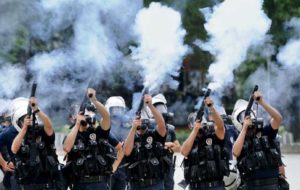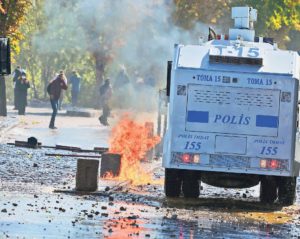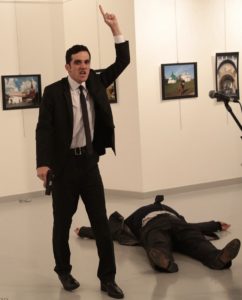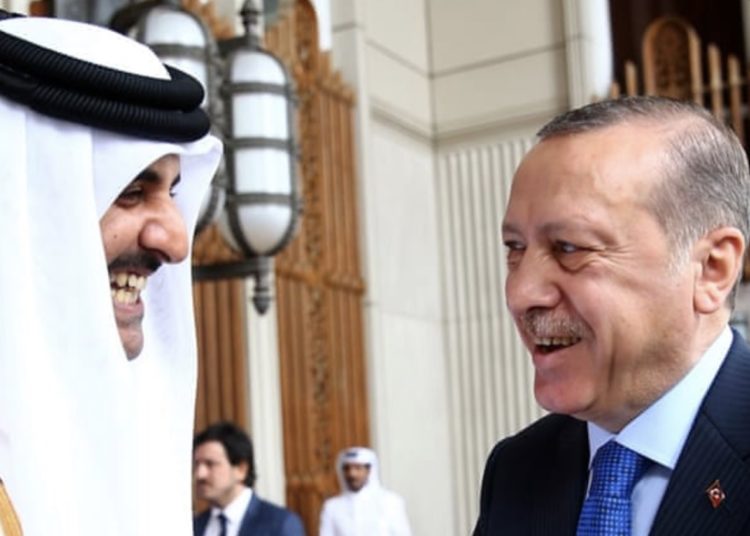Abdulah Bozkurt/Stockholm
The details of an agreement between Turkey and Qatar on the deployment of a Turkish police force ostensibly for FIFA World Cup Qatar 2022 reveal at least a five-year commitment of a Turkish police deployment in the Gulf nation.
The agreement, a copy of which was obtained by Nordic Monitor, makes clear that Turkey would have the option to deploy its police force in the Arab nation for the next five years with an option to extend the mandate further, although the intention was to secure the Turkish police presence for the security of the football tournament.
The move fueled speculation that the Islamist government of President Recep Tayyip Erdoğan is concerned about the sustainability of the Al Thani royal family in the governance of Qatar and wants to make sure the family, which has close links to Erdoğan, stays in power by securing a concession from Doha to deploy the riot police on the territory of the Gulf state within the next five years.
Turkey already has a military base in Qatar, where it maintains some 3,000 troops from the Land Forces Command. Ankara plans to expand the base with naval and air assets.
The protocol, titled “Letter of Intent on the Implementation of the Letter of Intent on Cooperation in Mega Event Implementation,” was debated in the Turkish Parliament’s Foreign Affairs Committee on March 1 amid resistance from the opposition. It was approved in the end with a majority controlled by the Erdoğan government.
“We are absolutely against this agreement, we have already declared that we will vote no, both in the committee and the General Assembly … because it was stated in Article 4 of the protocol when the Turkish personnel will be sent, but it is not specified when their duty will end. I mean, how long will these people stay there after the World Cup is over?” said Ahmet Ünal Çeviköz, an opposition lawmaker from the Republican People’s Party (CHP).
The text of the protocol, titled “Letter of Intent on the Implementation of the Letter of Intent on Cooperation in Mega Event Implementation,” will allow the deployment of a Turkish police force to Qatar within the next five years:
Turkey_Qatar_riot_police_agreement
Çeviköz asked what other assignments the police would be performing in Qatar after the World Cup is over.
“How long will this cup last? Isn’t it a month? Normally it takes a month. Why did you seek a five-year mandate from parliament in your letter of intent, we’re wondering,” said Utku Çakırözer, another lawmaker. He said he had asked this question before, with no response from the government, and expressed his concern that the Erdoğan government plans to provide security in Qatar for the next five years. That would be a terrible mistake if that is the true intention of the government, he warned.
Defending the agreement, Deputy Foreign Minister Sedat Önal said Turkey and Qatar have special ties and that their policies overlap in many areas from Libya and Syria to Palestine. He also recalled that Qatar is one of the few members of the Arab League that opposed statements and declarations against Turkey.
Asked if Turkey extends similar help to other countries, Önal recalled the recent conflict between Qatar and the Saudi-led Gulf bloc and Egypt and how Turkey helped free Qatar from its isolation. He noted that “this is not something to be provided to just any country, that’s why I emphasized the special relationship [with Qatar]. In other words, if any other country from the region came and made such a request, it would not be easy to reach the same understanding.”
He declined to respond to the questions of why the protocol covers a five-year period and whether Turkish police will remain in Qatar once the World Cup is over.

The bulk of the 3,251 police officers Turkey would deploy to Qatar would come from the Çevik Kuvvet (Riot Police), a nationwide police force that the government uses as a brutal force for cracking down on protests and rallies. It has some 30,000 police officers, corresponding to some 9 or 10 percent of the entire police force in Turkey.
Since 2014 the Erdoğan government has also made major changes in the police, removing most senior and veteran police chiefs after the December 2013 corruption probes that incriminated Erdoğan, his family and his business and political associates. The recruitment process for new police officers was also changed to reflect the government’s Islamist and nationalist ideologies.
Twenty-two-year-old Mevlüt Mert Altıntaş, a radicalized police officer who assassinated Russian ambassador Andrei Karlov in December 2016, was in fact working for the Çevik Kuvvet. Recruited by the government in 2014, Altıntaş used his police access to enter into an event attended by the Russian envoy and killed him while a news camera was rolling. After the murder, the assassin shouted jihadist slogans and said the killing was in response to the Russian campaign in Syria.
The opposition also claimed that Turkish police have no experience working in Qatar, lack intelligence capabilities, are hindered by a language barrier and would have difficulty in making assessments on risks and challenges on foreign soil.

Erhan Gülveren, deputy head of the Security General Directorate (Emniyet), the main law enforcement agency in Turkey, also defended the protocol and rejected allegations that his personnel lack the international experience necessary to provide security for the World Cup. He said an information center that will facilitate the exchange of intelligence between Turkey and Qatar was established to assess risks in the Gulf state.
The police chief is the only person who made a comment on why the protocol has a five-year term. He said his opinion was that the Turkish government wants to use the police for further cooperation with the Qatari government even after the World Cup is over.
He revealed that the personnel who will be deployed to Qatar will be selected in the summer of 2022 and will take a quick English language course as well as an orientation that will familiarize them with Qatari culture.
The agreement also requires that the Turkish police be placed under the command of a Qatari commander, which prompted concerns in the Turkish Parliament, with the opposition calling it unacceptable.
“No one, for example, referred to the statement in paragraph (13) of article 4, which means that the Turkish police will receive orders and directives from the Qatari authorities. For us, this is an unacceptable dimension of this agreement. Frankly, we have the understanding that the members of our police force and the Turkish police will be treated like private contract employees, and we can never accept this,” said Çeviköz.

The police force in Qatar would be receiving orders from a Qatari commander who will direct the force through a Turkish police chief. The police chief will serve as general coordinator and work as a point man with the Qatari authorities. He will be assisted by 20 other police chiefs who will act as advisors and be selected from various branches of the Turkish police.
According to Turkish government sources, Qatar will be committing 26,000 security personnel from own police, military and other branches to provide safety for the World Cup.
The protocol was signed by Turkish Interior Minister Süleyman Soylu and Prime Minister and Minister of Interior Sheikh Khalid bin Khalifa bin Abdulaziz Al-Thani on December 7, 2021 in Doha and specifies how a 2019 framework agreement will be implemented in practice. The protocol will become part of Turkish law after debate in the General Assembly, where it will most likely be approved, and is then sent to the president for his signature.












